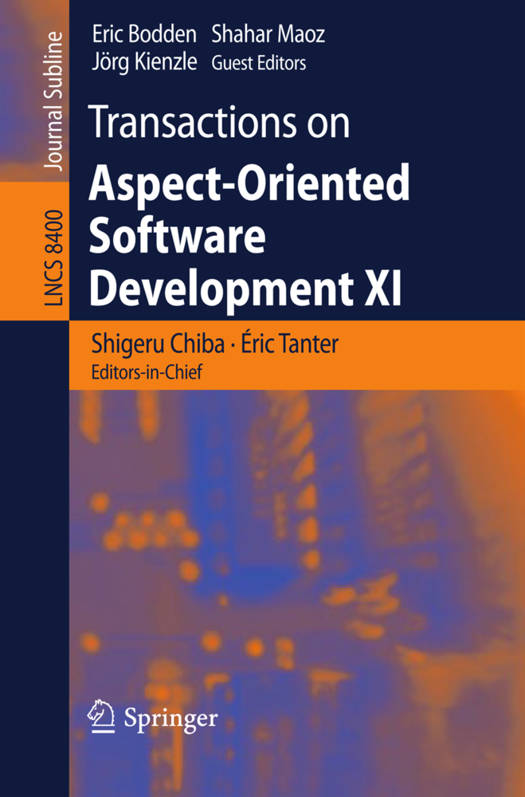
- Afhalen na 1 uur in een winkel met voorraad
- Gratis thuislevering in België vanaf € 30
- Ruim aanbod met 7 miljoen producten
- Afhalen na 1 uur in een winkel met voorraad
- Gratis thuislevering in België vanaf € 30
- Ruim aanbod met 7 miljoen producten
Zoeken
Transactions on Aspect-Oriented Software Development XI
Paperback | Engels | Lecture Notes in Computer Science | Transactions on Aspect-Oriented Software Development | nr. 8400
€ 83,95
+ 167 punten
Omschrijving
The LNCS journal Transactions on Aspect-Oriented Software Development is devoted to all facets of aspect-oriented software development (AOSD) techniques in the context of all phases of the software life cycle, from requirements and design to implementation, maintenance and evolution. The focus of the journal is on approaches for systematic identification, modularization, representation and composition of crosscutting concerns, i.e., the aspects and evaluation of such approaches and their impact on improving quality attributes of software systems. This volume, the 11th in the Transactions on Aspect-Oriented Software Development series, consists of two parts. The first part focuses on runtime verification and analysis, highlighting runtime verification as a "killer" application of aspect-orientation. The second part contains revised and extended versions of the five best papers submitted to Modularity: aosd 2013, presenting current research related to modularity and covering topics such as formal methods and type systems, static analysis approaches for software architectures, model-driven engineering and model composition, aspect-oriented programming, event-driven programming and reactive programming.
Specificaties
Betrokkenen
- Uitgeverij:
Inhoud
- Aantal bladzijden:
- 263
- Taal:
- Engels
- Reeks:
- Reeksnummer:
- nr. 8400
Eigenschappen
- Productcode (EAN):
- 9783642550980
- Verschijningsdatum:
- 8/05/2014
- Uitvoering:
- Paperback
- Formaat:
- Trade paperback (VS)
- Afmetingen:
- 152 mm x 229 mm
- Gewicht:
- 408 g

Alleen bij Standaard Boekhandel
+ 167 punten op je klantenkaart van Standaard Boekhandel
Beoordelingen
We publiceren alleen reviews die voldoen aan de voorwaarden voor reviews. Bekijk onze voorwaarden voor reviews.







